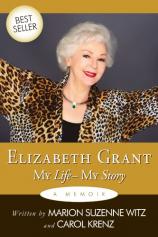Excerpt
Excerpt
Elizabeth Grant: My Life - My Story

The Early Years:
Lessons in Self-Reliance
I was born in the early 1900’s in London, England. The world was turbulent at the beginning of the twentieth century, caught in the crumbling grasp of Europe’s royal dynasties. Revolt and rebellion whispered through political corridors and uncertainty defined the era. In Russia, the Romanov Tsar, Nicholas II, wielded iron power, and within Russia’s western provinces, known as the Pale of Settlement, persecution against Jews meant deadly pogroms --- state-sanctioned, unprovoked attacks on lives and property. It was from this kind of assault that my mother, Alice, fled, along with her brother and two sisters. She had witnessed local brutality and had watched Cossacks burn her home to the ground.
Armed with considerable wits, she and her siblings headed to England. The rough voyage and subsequent entrance into London was similar to the experience of thousands of other refugees pouring into large cities in both Western Europe and North America. It was the age of the greatest population migration in history, marked by ever-increasing eruptions of war and the rise of new political movements.
In London, Yiddish-speaking organizations such as the Jewish Board of Deputies and the Zionist Federation stationed themselves at the piers, offering the new immigrants immediate help and information. When my mother arrived in London, she couldn’t speak a word of English. She had no money, no family, and no job. All she owned was what she was could carry and whatever her mother had sewn into her skirt.
Notorious for its Cockney inhabitants, its winding, narrow streets, and the salacious murders of Jack the Ripper, the East End became home to most of the new Jewish immigrants. Many took up the local needle trade, which had begun in the 1700s with Protestant Huguenots fleeing Catholic France. Traces of their elaborate couture shops and princely homes still dotted Brick Lane.
British society was in flux. Queen Victoria died in 1901, but the rigidity of social manners and mores --- not to mention the elitist class system --- was still very much in place. King Edward VII ushered in the brief Edwardian Age, a final and feeble nod to entrenched nineteenth-century values before the stirrings of modernity and the First World War in 1914 gave everyone --- from the manor on down --- a resounding shake, collapsing the rigid social structure of the British society. The war elevated the position of women in that women started to work in offices and munitions factories and do what was always termed “men’s work.” This was the true era of the emancipation of women. It was a time when women started to raise the bar for themselves, giving themselves a new sense of self-worth and a realization of what they were capable and able of achieving. The women in England threw off their Victorian ideals and started to create a new identity and a new place for themselves in society.
Elizabeth Grant: My Life - My Story
- paperback: 228 pages
- Publisher: AuthorHouse
- ISBN-10: 1449047602
- ISBN-13: 9781449047603

